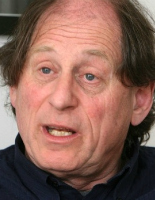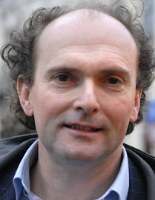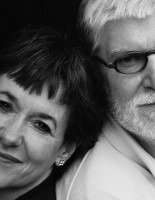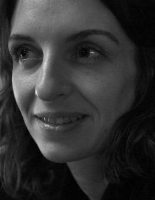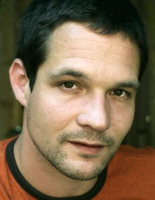Salomon Kroonenberg, Dutch writer
In the egg
A duck flies to and fro over the vast expanses of world ocean, desperately in search of a place to lay her egg. But as yet there is no land and no earth - nowhere can she see a grassy hillock where she can make her nest. So begins the creation myth of the Finnish folk epic Kalevala. Then the water maiden takes pity on the duck and raises her knee out of the water, on which the duck makes her nest and lays six eggs of gold and one of iron. But the water gets hotter and hotter, and the maiden feels such fire coursing through her veins that she shakes her knee. The eggs fall off and are dashed to pieces in the water, and from the fragments emerge the earth, the sky, the sun and the moon. I couldn’t help thinking of that story yesterday when our bus reached its destination: a huge egg of metal and glass - or rather, half an egg that has been cut lengthwise, in the middle of an immense lake. There is no bridge - I have no idea how I will ever be able to enter it. Did Paul Andreu have the *Kalevala *in mind when conceiving this work of art? I don’t know, but something is still being created here: it is the Beijing National Centre for Performing Arts.
Hardly a difficult text you would say, so why did she falter?
No small boats cross the lake to take you there; you descend a staircase to walk under the lake to the theatre entrance. And then it turns out that the lake is only a couple of centimetres deep: you can see from below the wavelets rolling over the glass aqueduct, a spectacle so fascinating that you have a strong urge not to move on. On the inside, the egg is covered with such marvellous striped marbles that I feel like lying with a magnifying glass on the floor all day so as to inspect them more closely.
Inside the egg today other forms of creative art are in focus: Kristofer Schipper, Emeritus Professor of Oriental Studies in Paris and Leiden, is being given the prestigious Special Chinese Book Award for his translations of classical Chinese poetry. He expresses his thanks in fluent Chinese, and an interpreter carries out a deft translation into English. Suddenly, the interpreter gets stuck - she hasn’t understood what Schipper said. He repeats it, but she still doesn’t understand. The chairman of the day intervenes, whispers something in her ear and, relieved, she translates: ‘Learning is a pleasure; sharing knowledge with others is also a pleasure, even if it remains unappreciated.’ Hardly a difficult text you would say, so why did she falter? I asked Kristofer afterwards. He explains to me what the problem was. It was a quotation from Confucius, the first sentence of his Conversations. He wrote in classical Chinese, which differs more from modern Chinese that Italian does from Latin. At the time when that interpreter grew up, classical Chinese was not taught, so people were no longer able to understand their own ancient texts. Fortunately, that has now been reversed, and interest in the old culture is overwhelming.
And then he expresses his dissatisfaction that little has survived of the teaching and study of classical Chinese at Dutch universities. All minor languages, all subjects that have no direct economic usefulness are under great pressure - and much has already disappeared. Now that Halbe Zijlstra, State Secretary for Education, Culture and Science in the Netherlands, has attended the book fair and the award ceremony, perhaps he - just as the Chinese - will seek to redress such an error. For economic usefulness cannot be predicted, and it would be a shame if all those talented young linguists had to continue flying desperately over the ocean because there was nowhere they could lay their egg.
